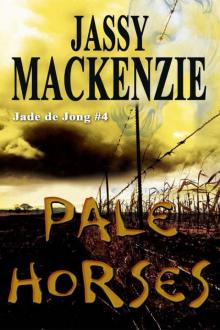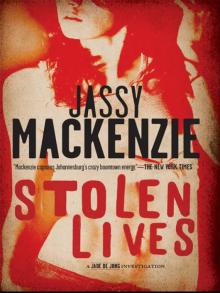- Home
- Jassy Mackenzie
Bad Seeds
Bad Seeds Read online
Books by the Author
Random Violence
Stolen Lives
The Fallen
Pale Horses
Copyright © 2017 by Jassy Mackenzie
This is a work of f iction. Names, characters, places, and incidents either are the product of the author’s imagination or are used f ictitiously, and any
resemblance to actual persons, living or dead, businesses, companies, events, or locales is entirely coincidental.
All rights reserved.
Published by
Soho Press, Inc.
853 Broadway
New York, NY 10003
Library of Congress Cataloging-in-Publication Data
Mackenzie, Jassy
Bad seeds / Jassy Mackenzie.
ISBN 978-1-61695-794-0
eISBN 978-1-61695-795-7
1. De Jong, Jade (Fictitious character)—Fiction.
2. Women private investigators—Fiction. 3. Murder—Investigation—Fiction.
4. South Africa—Fiction. I. Title
PR9369.4.M335 B33 2017 823’.92—dc23 2016042635
Printed in the United States of America
10 9 8 7 6 5 4 3 2 1
For Barry and Rosalie de Jong
Author’s note
Inkomfe Nuclear Research Center is a fictional place, based on the Pelindaba Nuclear Research Center, which is located in the same area of South Africa. The Robinson Dam referred to in the book is a fictional version of the Robinson Lake, which is also in western Johannesburg and affected by the same problem of acid mine water.
Chapter One
This is how you hide a body.
We’re not talking a scenario where you’ve had weeks to plan, to scope out the area, to assess the terrain. This is a rush job. Risky and dangerous, but a job nonetheless, and you are a professional.
First, the killing. Up close and personal is easy with the help of your accomplice, who provides a distraction at the right moment. The method you use is quiet. You’ve done it before. It’s also quick, bloodless and effective, but it requires skill and resolve.
You have both.
You maneuver the body into the car and drive the short distance to your destination, where you go about moving it to its permanent resting place.
“Where do you think he’s . . . ?”
Your accomplice speaks the words, and you mutter, “Shut up.” Voices can be overheard. You need to work, as much as possible, in silence. Sulkily, your accomplice refuses to help you any further, meaning that the job now rests on your shoulders alone.
The clock is ticking, and you need to get the body out of the car. You lean across the backseat, push the handle from the inside. At the same time, you breathe in, relieved that your nose can pick up no smell of urine or shit, which would have complicated things.
“Where do you think he’s . . . ?”
You find yourself repeating your accomplice’s nonsense words in your mind as you climb out of the car, stepping carefully over the uneven ground in the darkness, bending through the open door.
Lifting a dead person out of a car is difficult. Dead bodies are heavy, limp, awkward to handle. Limbs flop, creating a weight imbalance that can send the corpse slumping out of your grasp. It’s easier if you turn the person into a package first.
You truss the wrists and ankles firmly together, pulling as tight as possible, using thin nylon rope that will grip and will not slip.
Then you crouch down and get yourself underneath, pushing your head and shoulders through the loop that the trussed limbs have made and grabbing onto the arm with both your hands. This is an up-close-and-personal business, where you smell the trace of deodorant and stronger hint of sweat from the corpse’s underarms, and you feel hair tickling your face. This butterfly caress reminds you of a lover’s hair, a comparison you’d rather not have thought about and now wish you hadn’t.
You need to distance yourself; it’s easier that way. Think of it not as a corpse, but rather a heavy sack. Even so, this is not for the faint of heart, nor for the weak, because heaving yourself forward so that the body is pulled from the car seat and staggering into a standing position with this weight around your shoulders is a challenge.
You stand, limbs quaking, hearing your breath coming fast, puffing from your lungs. But you’ve found your balance, and you’re carrying the burden. Your feet scrunch over twigs as you stagger forward, and you have a nasty moment where the corpse’s shirt catches on an overhanging branch, yanking you both backward in a wild rustling of leaves.
Now you’re out of the woods, so to speak, limping onward with your load toward the bridge that crosses the dam. A hidden ditch nearly claims you both—you stumble into it and lurch out, your ankle twisting in agony as you save yourself. Your heart is racing now, your breath harsh as you gulp in the cool air, your progress marked by the startled caws of night birds you can’t see.
“Where do you think he’s . . . ?”
The words are bothering you, although logically they shouldn’t. But perhaps it’s that you’re focusing on the one thing that doesn’t matter to distract yourself from the grim reality of all the things that do.
You reach the top of the incline. At last you’re where you need to be. The whiff of poisoned water taints the air, and some light—the fat maggot of a quarter moon—casts faint shadows but does not glimmer off the dam’s fouled surface. Now you can drop to your knees, tilt your shoulders and allow the burden you have carried to slide off so that it flops down near the edge of the dam wall.
Sweat crawls down your cheek, and you shake it away. You stride back toward the car and then veer left, hoping the supplies you brought here yesterday are still undisturbed. You brush aside the covering of leaves and branches that offered a rough camouflage, and there they are. Two heavy concrete blocks, each twelve inches in diameter, with holes drilled through their centers, and a longer length of coiled nylon rope.
The easiest way to carry the blocks is with the handles you’ve already made by threading a piece of rope through each center hole and tying it. You sling the coiled rope around your neck and pick up a concrete block in each hand. The rope bites into your palms. They are heavy, but the load is more balanced than your previous one, so it is easier. Another minute, and you’re at the top of the hill, smelling the sour air, placing the concrete blocks next to the body and crouching down to do what you need to do.
Now your weighted load is ready for transfer. You loop the rope through it and anchor one end to the trunk of the nearest tree. You hold the other end tightly, and with your foot, you nudge and push the body, scraping it over the earthen bank until it reaches the point of no return and topples over the edge down to the brackish water below.
You fling your weight back as the rope burns your palm, hauling on it, trying to slow the fall of your victim, because an almighty splash you do not want. Inch by painful inch, you ease out the rope. The trickle of sweat has become a stream, tension and exertion combined, but your efforts are rewarded by the almost soundless plop as the corpse meets the water with barely a ripple spreading across its surface.
Now you can play out the rope faster, letting it slide through your hands as your victim completes the downward plunge, through water twice as deep as you are tall, to rest at last on the dam’s beslimed floor.
You let go of the rope, untie it from the tree and pull it out of the dam, coiling as you go, the length slipping through your fingers, first cool and dry, then slick and wet and stinking.
Then you stand up again, exhausted from your efforts, resting your hands on your knees for a moment. And it is then that you see it.
/>
Even in the muted light of that ungenerous moon, the shape is unmistakable. A human figure, facing you, dark jacketed, standing near the edge of the trees.
You draw a sharp breath, preparing to give chase, but before you can sprint closer, the man turns and swiftly melts into the cover of the bushes.
Now, suddenly, the half-finished comment your accomplice offered makes sense. “Where do you think he’s going?”
It was an observation; your accomplice had noticed that man.
Your job was not done in secret.
Somebody was watching; somebody saw.
Somebody knows.
Chapter Two
Jade de Jong saw the accident happen as if in slow motion. She was driving her rented Mazda into the forecourt of the Best Western motel, Randfontein, in the full fury of an evening thunderstorm. The windscreen wipers were whining back and forth on their fastest setting, and the rain was drumming down.
Through the storm’s chaos, she saw the silver SUV reverse out of the parking space outside one of the units and head at high speed toward the gate. She just had time to think, In the rain, they haven’t seen the pole. And then she watched as the truck slammed head-on into the sturdy, gray-painted metal post that supported the motel’s sign high above. Jade guessed that the sign was usually brightly lit, but the area was being load shed. This was the term given to the infamous rolling blackouts that had been implemented a few years ago by Eskom, the embattled national electricity supplier, and were now becoming more frequent.
The matte gray pole must have been invisible in the downpour. The truck’s grille folded into a deep V shape, the bonnet buckled upward and the vehicle slewed heavily to one side before rocking to a stop with its bumper still buried in the metal.
Jade drove into the parking lot and stopped a short distance from the truck’s ruined bonnet. She looked more closely but couldn’t see any movement from inside. Perhaps somebody was slumped unconscious over the steering wheel.
Best to take a look. Offer some help. She took her umbrella off the backseat and scrambled out. Rain hammered onto its black canopy as she splashed over to the other vehicle. “Do you—” she began.
She gasped as a bloodied palm slammed hard against the window from the inside.
It left a five-fingered crimson stain that oozed slowly down over the glass.
Jade grabbed the door handle and yanked it open. Inside, as she’d expected, the smell and powdery bulk of a half-deflated air bag. And a woman. A petite woman with blonde hair and blue eyes. She was breathing hard—sobbing, in fact. Her eyes were streaming, and her hand was clamped over a nose that was spouting blood.
“Tip your head back,” Jade advised. She glanced into the car. No convenient box of tissues.
She hurried back to her own car, flinching as lightning bathed the courtyard and a deafening clap of thunder split the air.
The rental company that supplied her rides always put a pack of Kleenex in the glove compartment. She took it out, ran to the SUV and wedged the umbrella between the car’s roof and the open door. She tore the packet open and passed a handful to the injured woman.
Smears of blood on the deployed air bag, on the window glass, on the woman’s face. She wasn’t wearing a seat belt. The air bag must have hit her like a giant fist. It could have broken her nose.
“Try putting your head down slowly,” Jade advised.
The woman did so. She lowered the bloodstained tissue. The flow had abated, although her nose looked swollen and her eyes were red.
“You want me to get you some ice?” Jade asked, glancing at the motel room door—number twelve—from which the woman had been driving away.
“Uh-uh,” she said. Her voice was croaky and uneven, her breathing still rapid, but the tone emphatic.
“You sure?”
“I’m fine.” And then, in a desperate-sounding tone, “Go away!”
Jade wasn’t a busybody. Hell, she wasn’t even a very good Samaritan. If the woman wanted to sit here and bleed on her own for a while, Jade wasn’t going to stop her.
“All right, then,” she said. “Take care.”
The inner voice she’d learned long ago to trust was telling her something was wrong here—very wrong. But there was no time to worry about this. She wasn’t here to help strangers. She was on a surveillance job.
She turned away, splashed back to her car, climbed in and pulled the wet umbrella in after her. Carlos Botha, the man she was following, had driven around to the motel’s reception area as she’d pulled into the parking lot. When she eased her own car around the corner, she saw his white Porsche parked outside the office door.
Jade stopped in the farthest corner of the lot and waited until she saw him drive across the lot to room number nineteen. She saw the door slam shut, and then he was inside.
He’d booked into such an out-of-the-way motel. Why, she had no idea. But for now, she might as well check in, too.
The Best Western motel in Randfontein had seen better days, that was for sure. The lobby must have been redecorated in the eighties, and the receptionist looked like she was about to audition for the Rocky Horror Picture Show. Thanks to the load shedding, it was also steeped in gloom. The only light came from the screen of the receptionist’s laptop, and from three candles burning on the counter. The candles added to the eighties effect. The 1880s, Jade decided.
“Power’s due back on at seven,” the receptionist told her, handing over a room key.
When Jade unlocked her room, the first thing she saw in the beam of her phone’s flashlight was a large cockroach in the middle of the gray-tiled floor, staring back at her, unafraid.
“Roaches are actually clean creatures,” she remembered a restaurant manager telling her long ago. “They preen themselves often.”
That fact didn’t give her much comfort right then. She marched over to the roach, ready to stomp it, but as she brought her foot down, it scuttled to safety under a baseboard.
“Show your ugly face in this room again, and you’re history,” Jade warned the roach. Reflexively, she curled up her toes in her drenched shoes. She put her bag on the chair, deciding it would be safer not to unpack. What other creatures were hiding out in this motel? Moths in the cupboard? Bedbugs in the mattress? She opened the curtains to let in what little light there was. The added illumination did nothing to improve the décor, but through the window, she could see Carlos Botha’s Porsche parked outside the door to room nineteen.
She needed to get hold of a spare key for that room.
The door locks here were simple enough. In the words of a locksmith she’d known, they would have been a joy to pick. Security here, like the décor, was also from the eighties. Lock picking wasn’t her specialty, though. She hoped getting a key would be quicker and easier. Angling her umbrella to shield herself from the gusting rain, she ran back to reception.
The receptionist looked bored and tired as she stared at her computer screen with her chin in her hand before swiveling her gaze in Jade’s direction. Her eyeliner had smudged, and her big sprayed style had started to wilt.
“I wonder if you can help me,” Jade asked, shaking out her umbrella and closing it up. “I have a small problem.”
“Sure.” The woman sighed, pushed her chair back and glanced longingly at her screen again in a way that convinced Jade she’d been playing a game. Solitaire, if she had to put money on a retro-themed guess.
“The door hinges in my bathroom are squeaky. Is there any chance you could oil them for me?”
The receptionist checked her watch before shaking her head. “It’s after five. Handyman’s gone home. I can put it on the list for tomorrow.”
Jade needed to get her out from behind that desk, so if one way hadn’t worked, she’d have to try another. “Also, I’d like an extra blanket.”
Looking resigned, the receptionist heaved h
erself to her feet.
Once she’d gone, Jade checked to make sure nobody else was coming. She propped her umbrella against the wall, moved the candles to one side and scrambled over the wooden counter that separated reception from the back office.
Working fast and quietly, she opened the steel cupboard where she had seen the room keys were kept. There were two spare keys for every room, hanging on numbered hooks. Her phone’s flashlight helped her identify number nineteen. To her annoyance, there was only one spare key on room nineteen’s hook. Jade hoped the receptionist wouldn’t notice the gap. She didn’t seem to be the noticing type. Jade took the key and pocketed it.
Then she did everything in reverse. Lock cupboard, close drawer. She looked at the computer screen when she turned around to see that the game had indeed been solitaire. Pity she hadn’t put any money on that bet.
She was back over the desk and waiting innocently when the receptionist returned five minutes later, carrying a threadbare blanket.
With the blanket, Jade walked out into the gusty, blowing darkness. The storm had passed over, leaving behind a spattering residue. The silver SUV was still where she’d seen it, its bumper buried in the steel post.
The driver’s door was still open. The car was empty, its upholstery and bloodied air bag now sodden with rain.
It was an expensive vehicle, and the damage could probably be repaired. Had the woman gone back to her room? If so, why hadn’t she closed the door? Why was the rain being allowed to blow in, saturating the carpets and ruining the plush leather seat?
It made no sense at all. Jade’s instinct was telling her something was amiss, prickling her spine with chilly fingers. She decided to check just to set her mind at rest. She turned away from the car and headed toward the closed door of number twelve.
Chapter Three
Warrant Officer Thokoza Mweli, Acting Station Commander of the Randfontein South African Police Service division, got the call at twenty to seven in the evening.

 Pale Horses
Pale Horses Bad Seeds
Bad Seeds Random Violence
Random Violence Folly
Folly Stolen Lives
Stolen Lives The Fallen
The Fallen Soaring
Soaring Drowning
Drowning